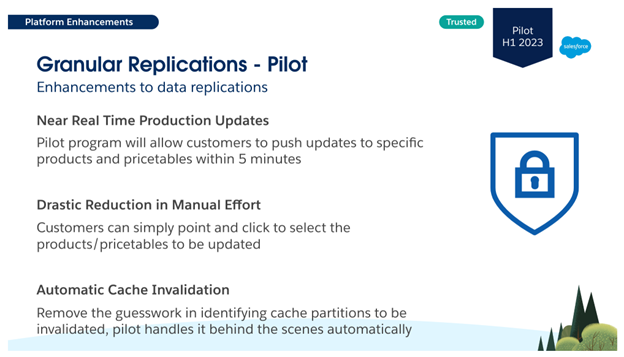Salesforce Commerce Cloud’s H1 roadmap is chock-full of interesting updates, many of them flashy.
Among the attention-grabbing highlights:
- Einstein GPT for Commerce will level up content automation and personalization on the platform, enabling customers to see personalized product descriptions without merchandiser effort using AI’s generative capabilities
- TikTok and Salesforce promise to give merchandisers and marketers a new Gen-Z-friendly channel for D2C commerce
- Google Shopping and Salesforce promise to give the world’s #1 search engine the power to tap into your local and general inventory more seamlessly
But there is one feature that stood out to me as a truly outstanding game-changer. It doesn’t have the flashiest name, but it unlocks true flexibility, agility, and safety for every Commerce Cloud customer: granular replications.

Let’s unpack that term: In Commerce Cloud, replication is the mechanism by which both merchandisers and operations team members deploy changes from lower environments (staging) to their storefront (production). Whether it’s a content update, a pricing change, or even new code, retailers publish these changes via the secure process called replication.
To date, Commerce Cloud customers couldn’t choose to replicate only certain products, or only certain price table entries within a pricebook. Replications could only be configured at the higher level: entire catalogs and pricebooks.
This was a pain point, because in terms of publishing products and pricing, it had been all or nothing.
Now that’s changing, and I couldn’t be more excited about all this implies. This will help Salesforce customers in a number of ways:
- Increased agility and flexibility to publish products as needed.
- Increased performance, publishing without impacting the rest of the storefront and the precious web cache.
- Increased security, helping merchants avoid bad habits like “quickly going into production to fix this one typo.” (Please don’t do that.)
Again, granular replications are only in pilot, meaning you need to request access via a Salesforce Help ticket or from your Salesforce account manager. I recommend every customer do so right away.
With more than 16 years of experience and 350-plus certified engineers, Astound is your trusted Salesforce implementation partner. To learn more about these upcoming features and how they may impact your brand, get in touch with our Salesforce Commerce Cloud experts.
